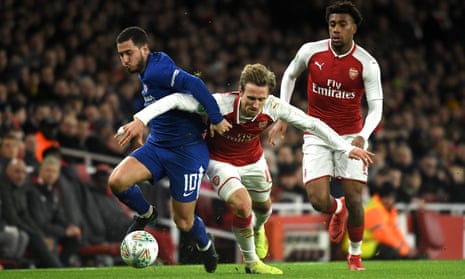At half-time in the latest fun, slightly ragged instalment of the Arsenal-Chelsea stasis the sense of two teams battling for the right to lose to Manchester City at Wembley was tangible. For periods in the first half at the Emirates it was hard to remember a time before Arsenal and Chelsea had been playing each other, apparently endlessly, without any sign of resolution.
In the end something did happen. Arsenal got hold of Eden Hazard, and in the process managed to disarm almost completely this lop-sided Chelsea team.
It is no secret Chelsea have a chronic case of Hazard-dependencia – unsurprisingly given Hazard’s basic rarity value. With Alexis Sánchez tinkling his tiny piano in Manchester, with Mesut Özil ghosting about hopefully here but only rarely intersecting with the earthly plane, there was a lack of sparkle in both teams in the opening half-hour, a void filled by a player who seemed at times to be playing three positions at once.
At kick-off Hazard had lined up in a role that lurked between false and real nine. And for a while Arsenal’s back three seemed baffled. With seven minutes gone N’Golo Kanté’s pass reached Pedro in open green space. He found Hazard, who took two steps and finished with startling ease, like a man taking a final touch on the training pitch while wondering idly if it is lasagne for lunch again.
After which Hazard dropped deeper, prompting and linking like an old-school No 10. Briefly he became a scowling No 4, Chopper Hazard, earning a booking for hustling Özil to the ground. A bit later he was an invisible nine, setting Willian away in space with a dummy that threatened to draw a snort of laughter, the kind of step-over that is not just telegraphed but sent registered delivery with regular tracked updates.
The game changed, and indeed sprang into broader life, the moment Arsenal worked out how to stop Hazard. Arsène Wenger deserves credit here for his tactical flexibility, his willingness to shift and react instantly. Yes, really. And one more time just for the fun. Arsène Wenger deserves credit here for his tactical flexibility, his willingness to shift and react instantly. Mohamed Elneny dropped deeper and began to man-mark Chelsea’s lone star. Hazard twinkled and broke when he could but was often crowded out. Deprived of one attacking option Chelsea found themselves with no attacking options.
Arsenal had already struck back, exerting enough pressure to force a comical head-tennis own goal from Antonio Rüdiger. And steadily they wrenched the initiative with Jack Wilshere having another fine game. Granit Xhaka found himself on the ball a lot more, liberated by Elneny to play the passing, running role that suits him best. His goal to make it 2-1 was a fitting reward for an increasingly invigorating team performance As opposed to…what exactly? Quite how Chelsea have come to rely so heavily on their best player is a matter for the club’s transfer committee. Money has been spent. But on players who look lost, blunt, out of time. The nicest thing you could say about Ross Barkley’s Chelsea debut was that it did eventually end.
Clearly these failings of recruitment are a source of real tension with Antonio Conte. The increasingly bizarre mooted signings of the last few days – Andy Carroll , Ashley Barnes, a triple-sized second-hand Ikea wardrobe – have come across as a kind of sulk, the managerial equivalent of being told, no, you can’t have a new hat and flouncing off down the road wearing a brown paper bag saying ‘look what you’ve made me do’.
Here his players proved Conte’s point. Stop Eden, stop Chelsea. Through the departures Hazard has remained, still the would-be galáctico, still the next next-best, still brilliant, still at Chelsea. If there is a real concern, beyond the obvious creative struggles, it is the lurking fear this might be a problem neither Chelsea nor Hazard have to deal with that much longer.

Comments (…)
Sign in or create your Guardian account to join the discussion